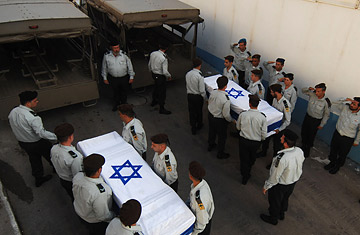
Israeli soldiers carry the coffins of two soldiers returned in a prisoner swap with Lebanon's Hizballah at the Rosh Hanikra border crossing with Lebanon in northern Israel on July 16, 2008.
For two years, the father of Israeli soldier Eldad Regev never lost hope that his son might return home alive. But on Wednesday morning, sitting with his wife and relatives, Tzvi Regev watched on TV as a Lebanese vehicle pulled up at the Israeli border post. Red Cross workers unloaded two black lacquered coffins, confirming the terrible truth: Eldad Regev was dead.
"To see it on TV, watching them put the coffins on the ground was dreadful," says Regev. "I asked them to turn off the TV set. For two years, we were driven by the hope that our son might still be alive."
In two years of bargaining over the return of Regev and Ehud Goldwasser — the two Israeli soldiers whose capture by Hizballah in a cross-border raid in the summer of 2006 triggered a month-long war — the Shi'ite militia had never let on that their two hostages might be dead. This cruel game had allowed the Regev and Goldwasser families to hope against hope that their loved ones might come bounding out of the Lebanese Red Cross van that instead was carrying their coffins.
Hizballah's macabre tough tactics with the Israelis had worked: The Jewish State's primal yearning for the return of its two boys, dead or alive, forced Prime Minister Ehud Olmert into a prisoner exchange that many Israelis saw as necessary but unsavory: In exchange for the caskets containing the remains of Regev and Goldwasser, Israel released five Lebanese prisoners — including Samir Kuntar, who had been responsible for the death of an Israeli father and his two children in 1979 — and the bodies of more than 190 dead Lebanese and Palestinian fighters. Early in the war, Israeli authorities concluded that the two soldiers had most probably died from wounds sustained in the original ambush, and Israeli commandos had staged a fruitless raid on a hospital in the Bekaa Valley in the hope of recovering their remains.
Israeli intelligence experts told TIME that Wednesday's prisoner swap will complicate negotiations currently underway, via Egyptian intermediaries, for the release of another Israeli soldier, Gilad Shalit, held captive by Hamas somewhere in Gaza. "This was a big mistake," one officer said. "Next time, we'll have to pay more."
Not that Prime Minister Olmert had much choice. He had launched the Lebanon war ostensibly to rescue Regev and Goldwasser, but also — with the Bush Administration's prodding — to destroy the military capability of the Iran-backed Hizballah movement. Olmert's invasion failed on both counts. And it was only by securing the release of the two soldiers, even at a high cost, that Olmert and the Israeli people could achieve closure on the debacle of the Lebanese war. Also, the Regev and Goldwasser families, through low-key but eloquent lobbying in Israel, the U.S. and in Europe, had created a groundswell of public pressure for a hostage exchange that Olmert could not ignore, despite warnings against it from his military and intelligence advisers.
The scorecard may have been best summarized by a banner stretched across the road on the Lebanese side of the border, which read: "Lebanon is shedding tears of joy, Israel is shedding tears of pain." The Lebanese government declared a national holiday to celebrate the prisoner exchange, and Kuntar was singled out as a hero. In 1979, he and three other guerrillas had rowed ashore in a dinghy and raided an apartment building in the Israeli coastal town of Nahariya, carrying out the brutal killings. "I don't know what world I'm coming out into," Kuntar apparently told his Israeli jailors. Kuntar was only 16 when he participated in the deadly guerrilla raid; now he's a stocky 45-year-old with a mustache.
Israeli military officials waited until after conducting identification tests on the two bodies of Goldwasser and Regev before notifying the grieving families. Afterwards, Goldwasser's father, Shlomo, in a voice of ice-edged fury, asked the Lebanese people to consider the sacrifices they made during the war sparked by Hizballah's kidnapping of Regev and his own son. "They've lost some 800 men and their entire economy, and for what? For someone who killed a four-year old? Can someone like that be called a hero? He's nothing more than a bastard." Many Israelis agreed, but the high price of freeing Kuntar was worth it, they say, to bring home Israel's two lost sons for burial.
— With reporting by Aaron. J. Klein/Rosh Hanikra
